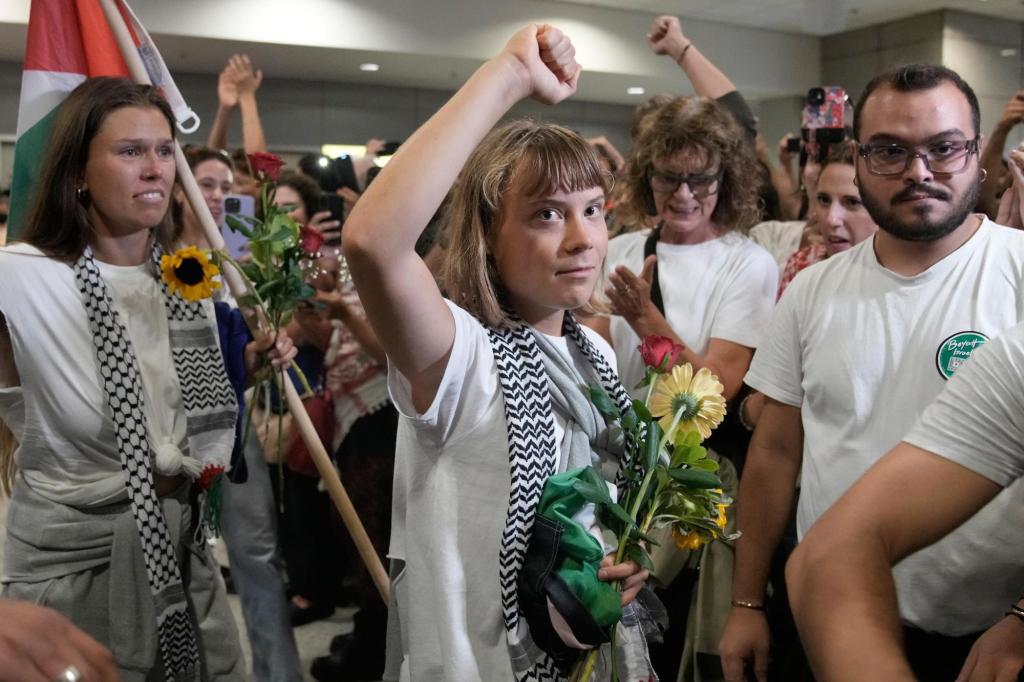In recent events, the tension surrounding humanitarian aid efforts to Gaza has escalated dramatically. A flotilla aimed at delivering assistance was intercepted by Israeli authorities, resulting in the deportation of numerous activists, including well-known figures such as Greta Thunberg. This incident has not only sparked outrage across the globe but has also renewed discussions about the ongoing humanitarian crisis in Gaza. How can one humanitarian mission ignite such widespread protests? Let’s delve into the details of this complex situation.
Understanding the Flotilla’s Purpose and Implications
The Global Sumud Flotilla was organized with the noble intention of bringing aid to those suffering in Gaza. However, Israeli officials viewed it as a direct challenge to their maritime blockade. The deportation of 171 activists from various countries, including Greece, Sweden, and the United States, highlights the international implications of this humanitarian effort.
Yet, the repercussions go beyond mere deportation. The interception has ignited demonstrations globally, with supporters advocating for the liberation of Palestine and raising awareness about the humanitarian conditions in Gaza.
Eyewitness Accounts and Activist Responses
Upon arrival in Greece, Thunberg expressed her dismay, stating, “It is a shame that this mission has to exist!” Her remarks resonated with many who gathered at the airport, as the atmosphere was charged with calls for justice and solidarity with the Palestinian people.
Activists have shared harrowing stories of their treatment during detention. Lubna Tuma, a lawyer representing some detained activists, revealed that around 150 individuals remained imprisoned, with a significant number participating in a hunger strike. This act of protest underscores their commitment to the cause, as some declared their intention to redirect their food to those in need in Gaza.
Accusations of Mistreatment and Responses from Authorities
Many activists have alleged mistreatment during their detention, claiming they faced violence and humiliation. One Dutch participant recalled her experience, stating, “There was some dehumanizing and violence and shouting.” Conversely, Israeli officials have denied these allegations, asserting that rights were respected throughout the process.
Interestingly, reports indicate a disparity in treatment based on nationality, with activists from North African countries claiming harsher conditions compared to their European counterparts. This discrepancy raises questions about the fairness of treatment in such high-stakes situations.
International Reactions and Ongoing Efforts
Governments around the world are responding to the situation, with some nations working to repatriate their citizens swiftly. For instance, South Africa announced plans to bring its detained citizens home via Jordan. Meanwhile, other governments have engaged in diplomatic discussions to ensure the safe return of their nationals involved in the flotilla.
This incident has not only highlighted the urgent need for humanitarian aid in Gaza but also the complexities of international diplomacy in conflict zones. What will be the long-term consequences of these events on global humanitarian efforts?
The Bigger Picture: Humanitarian Crisis in Gaza
While the flotilla’s activists aim to draw attention to the plight of Palestinians, the ongoing conflict between Israel and Hamas continues to be a pivotal issue. As the second anniversary of the war approaches, the urgency for a resolution and humanitarian assistance grows ever more pressing.
Activists like Thunberg remind us that “We cannot take our eyes away from Gaza.” This call to action serves as a powerful reminder of the importance of compassion and solidarity in the face of adversity.
As you reflect on this situation, consider how global activism can play a role in shaping policies and addressing humanitarian crises. Will you join the conversation and advocate for change?




















